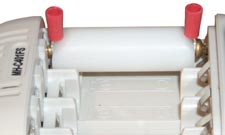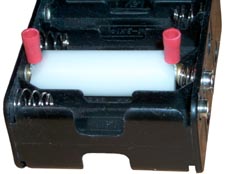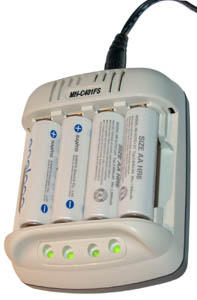Maha MH-C401FS
Battery Charger
© Brooke Clarke 2007
Background
Features listed on product box
Specifications listed on product box
Power Supply
Observations on Consistency
Adapter to Other Battery Sizes
Links
Background
To charge the Sanyo eneloop Ready To
Use (long shelf life) AA cells I wanted a good charger and asked
Thomas
Distributing what they recomend. I had also read that this
charger did a good job on Ni-MH AA cells so got it. There
was a
notice in the box saying that the cover has been removed on this
improved model. It appears to take four of either AA or AAA
cells
and there's a switch for FAST or SLOW charging.
In fast charge mode it may fully charge the Sanyo eneloop cells in
20
minutes. Since the LEDs change from red to green and there's
no
sound, it's hard to know when it's finished charging. The
cells
are warm (nice to hold on a winter day) but not hot.
23 Oct 2007 - the factory says that they are using a discharge
pulse
along with the charging pulses, but only every now and then not
between
every charge pulse, so this is really a
Burp Charger (I like them).
Features listed on product box
- Rapid charge Ni-MH AA batteries in under 100 minutes, cooly
and efficiently.
- The unique charging algorithim developed by battery experts
allows the battery to accept a more complete charge.
- Four independent charging circuuits to ensure optimum charging
for each battery.
- Ultra low temperature charging using PowereEx's unique FLEX
NEGATIVE PULSE algorithim.
- Manually switch between 100 minute fast charge and 8 hour
gentle charge, both microprocessor controlled.
- Can be powered by AC adapter and cigarette-lighter car
adapter.
Note that California either has or is about to pass a rule about
"always on" electrical devices in terms of their energy
efficiency. The supplied 12 Volt wall wart is one of the
new
Switching Mode Power Supply types that is much smaller and
lighter than
the older linear wall warts rated for the same power. They
also
have a big advantage in the you can stack them cheek to jowel on
AC
power outlet strips.
The input is "12 Volts" and it may take a Kobicon 3209, Mouser
171-3209 DC Power Plug (I haven't tested that, but it
comes close the measured plug ODxID of 3.77 x 1.3mm).
Specifications listed on product box
- Rapid charge current: 1000 ma
- Cell Configuration: One to Four AA/AAA Ni-Cad or Ni-MH
- Microprocessor: Negative Delta V, four independent channels
- Power Supply Voltage: 12 V 1000 ma
Power Supply
When Four dead cells are connected
at
the same time in the fast charge mode the power supply current at
12.0 volts input exceeds
1,000 ma. As each cell becomes charged (green LED) the
current
drawn by the charger drops. After all the cells are charged
the current draw is under 40 ma.
Note that the small wall wart power supply is one of the new
California
compliant type that's energy efficient. These are much
lighter
and smaller than the old linear regulator type. They also
are
skinny in the correct dimension so that you can stack them cheek
to
jowl in outlet strips.
Observations on Consistency
In order to measure the shelf life
on the eneloop
Ready To Use batteries
it's necessary to get some
idea of
how repeatable (note 4)
the same cell can be measured. For example if a 2000 mAh
cell can
be measured to better than 100 mAh but not as good as 10 mAh (the
numbers I think as of 23 Nov 2007) then the minimum time between
shelf
life tests can be estimated.
Reading the literature on battery capacity and talking to the
Sanyo
engineer who did the shelf life testing indicates that there's a
strong
function of temperature present, the recommendation being that all
testing be done in a temperature controlled chamber. So far
I'm
doing all the testing at the table where my computer is
located.
This is an indoor location that has heating (some by the computers
and
other equipment that's running 24/7 and a small floor heater or
the
whole house heater or air conditioner. The temperature is
about
60 F.
The Sanyo Twicell (their name for standard Ni-MH cells) manual
talks
about charge termination methods, but does NOT mention negative
delta
V. The charge termination methods are:
- 130% of mAh capacity
- Temperature above 60 deg C
- Peak voltage of battery exceeds a threshold
- delta Temperature/delta Time
- difference between battery Temperature and room temperature
The C401FS adds a
topping
charge after it makes the charge termination decision thus filling
the
battery completely. The negative delta V charge termination
method is known to prevent over charging and to provide about 85%
of
the capacity of a standard 16 hour charge at 0.1C.
If the negative delta V charge termination method is sensitive to
temperature then the capacity testing results when using it will
show
much more variance than the 16 hr 0.1C charge or where
there's a
topping charge. This may be the reason that Sanyo is not
recomending negative delta V and the reason I'm getting better
than 1%
repeatability after changing from the C9000 to the C401FS
caharger.
Adapter to Other Battery Sizes

I'd
like ot use this charger on other cells, likeSubC aka SC or "D"
size. A way to do that would be to put a dummy battery into
the
C401FS and run wires to a battery holder for the target battery
size.
This is the first prototype adapter that meets the outline drawing
for
a AA battery, but there are further requirements that need to be
met
for operation in the C401FS, although it does fit.
The
C9000
charger/discharger/conditioner also has it's own requirements
which will be included in the next prototype.

The
adapter can be installed in places where there is an open space
for the
terminals and wires to exit but not things that are closed like a
flashlight.
For example to test a 10 AA battery holder one, two or as many of
the
AA to wire adapters could be installed allowing measurement of the
holder.
If you are intested in this type of adapter please
let me know for what size battery.
Links
Steve's
Review -
Instruction sheet at Maha mhc401fs.pdf
Imaging
Resource Review - I believe that the 401FS will take cells to
very nearly 100% capacity if they're left in it overnight, to let
the trickle charge "top off" the cells, but I haven't tested
overnight charge cycles yet for this charger. Don't run
the
charger with the lid closed -(B.C. note: the lid no longer is
part of the 401FS) NiMH cells lose anywhere from about 1-3% of
their charge each day..
Back to Brooke's PRC68, Alphabetical web page list, Products
for Sale, Batteries, Battery Chargers, Battery
Patents, Battery Test, Military
Information, Personal Home
[an error occurred while processing this directive] page created Oct 19,
2007.




 I'd
like ot use this charger on other cells, likeSubC aka SC or "D"
size. A way to do that would be to put a dummy battery into
the
C401FS and run wires to a battery holder for the target battery
size.
I'd
like ot use this charger on other cells, likeSubC aka SC or "D"
size. A way to do that would be to put a dummy battery into
the
C401FS and run wires to a battery holder for the target battery
size. The
adapter can be installed in places where there is an open space
for the
terminals and wires to exit but not things that are closed like a
flashlight.
The
adapter can be installed in places where there is an open space
for the
terminals and wires to exit but not things that are closed like a
flashlight.